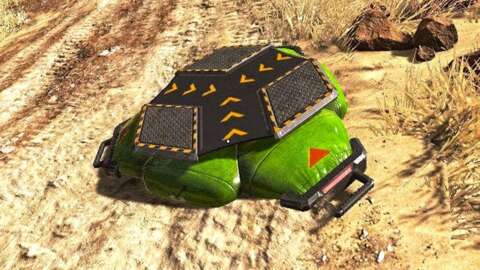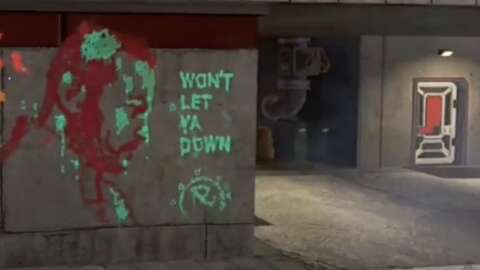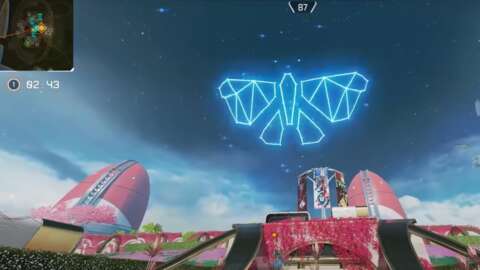Apex Legends is celebrating two major milestones this month: Its 20th season, and its 5th birthday. After shadow-dropping in 2019, the free-to-play FPS became an instant classic, receiving praise for its lovable characters and its expansive storyline, which has been ongoing since the game launched. But the last five years have been a particularly wild ride for developer Ashley Reed, who started out writing content for Apex’s official website but now serves as the game’s lead writer. In honor of Apex’s five-year anniversary, GameSpot sat down with Reed to get the scoop on Season 20: Breakout’s narrative arc, talk about some of the game’s biggest plot twists, and find out what it’s like to write a story with 25 main characters and no ending in sight.
Reed–whose name served as the inspiration for Ash‘s human name–has worked for Respawn since 2016, starting out as a content writer for some of EA’s websites before being tapped to work as a writer for the game itself, and eventually becoming Apex’s lead writer in 2021. Despite sharing a name with one of the game’s most vicious, unempathetic characters, chatting with the real Ashley Reed revealed that she’s personable, humorous, and above all, incredibly enthusiastic about her work. But with no new Legend scheduled to join the roster this season, I was curious to learn exactly why that was the case, what role Reed plays during “Legend-less” seasons, and what kind of plot twists players can expect in Season 20 and beyond.
“Typically, with the the anniversary seasons–the first season of the year–we try to let the celebration take center stage, so we try not to introduce a lot of plot-heavy stuff during the anniversary season,” she explained. “Especially this one, it’s a big anniversary! We don’t want to distract from that [by adding a new Legend with a new backstory].”
Reed told me that another reason Season 20 has no debut Legend is simply to help players keep the story straight, as Season 18 and 19 were extremely lore-heavy. But no new Legend doesn’t mean no plot development. When asked who Season 20’s story is focused on, Reed revealed that Horizon (and potentially, Ash) are at the center of the game’s narrative arc this season.
In the Season 20 launch trailer, Horizon can be seen looking wistfully at what I immediately recognized as part of Jack Cooper’s infamous time-altering wristband from Titanfall 2–or something very similar to it. Given the fact that Horizon’s main goal is finding a way to time-travel back to her son, Newton, gaining access to a time-altering piece of technology could have far-reaching (and potentially disastrous) consequences.
“You’re on the right track; I think you saw it,” she told me after I inquired about the time-traveling tech from the Titanfall series. “You get a little hint that something’s going on with Horizon [in the launch trailer]. It may be worth looking at that shot again from the end of the trailer.”
Although a new season of the game drops like clockwork every three months, Apex’s storyline hasn’t always followed a predictable pattern. It launched with minimal lore, slowly adding more little story tidbits that hinted at future plot points–a process Reed refers to as “breadcrumbing”–until the narrative floodgates truly opened with the introduction of Season 5’s Broken Ghost questline, which concluded with the revelation that Titanfall 2 antagonist Ash was alive (well, sort of). More recently, the narrative began tangibly bleeding into gameplay itself, with Season 18 featuring a brand-new set of abilities for Revenant–and a storyline that explained where those abilities came from. But telling such a complicated tale can’t be easy, especially given the frequent addition of new characters, so I wanted to know what the last five years have taught Reed about writing an ongoing story for a live-service game that doesn’t plan on concluding anytime soon.
“One of the biggest questions we’ve asked over the years is, ‘How can you tell a story without elaborate cutscenes or big story beats that stop everything and take center stage?’ While we’ve had our share of those moments through our awesome trailers, we’ve also found that people are drawn to smaller, subtler stories too,” Reed explained. “We got great reactions from the voicemail we hid below the Mirage Voyage where we hear Mirage talking to his mom, and people were really excited about the mysterious blue door that appeared in the game a couple of seasons ago–and they were right to pay attention to it! Variety is the spice of life, so we’ll always keep trying new things and experimenting with different ways to tell a story, but we’ve discovered a little can go a lot farther than we ever thought possible.”
Despite no new Legend joining the Apex Games this season, there’s still plenty of narrative fun for players to look forward to. In fact, Season 20 will see the introduction of a new series of in-game lore drops that Reed referred to as “vignettes.”
“We’ve posted radio plays on our social media channels in the past,” Reed said, referring to the fully voiced (but not fully animated) shorts that are sometimes posted to Apex’s Twitter account. “They’re usually a bit longer [than vignettes].”
“[The vignettes are] gonna be the evolution of Apex episodes, we’re moving away from the text-based stuff,” Reed said, referring to the in-game story chapters that currently feature sound effects and dialogue, but no animation or voice acting. “[Vignettes are] gonna be in-game, fully voiced with animated bits to them.”
When asked about the switch to the new vignette format, Reed said Respawn’s goal is to make Apex’s lore available for players to engage with in-game. Despite an official lore hub being launched during last year’s anniversary celebration, it seems Reed and the rest of the narrative team want to make the story significantly easier to follow, especially for new players.
“One of our initiatives this year is to make things more central, because that is one of the things that’s been brought up: It’s hard to keep track of [the game’s narrative],” Reed said of Respawn’s efforts to prevent players from getting tangled up in the game’s many plot threads.
Apex’s ongoing storyline last left off with the final episode of the Kill Code animated web series, which saw the Legends face the fallout from Torres “Duardo” Silva’s murder. Given that arc’s explosive ending, I was quite curious to find out if another Kill Code-esque animated series might be on the horizon.
“You can expect something that’s very like Kill Code over this next year, like an evolution of that,” Reed confirmed. “Kill Code was our first, ‘Let’s tell a big story across the full year and have that be a foundation for what’s coming in the game!’ kind of thing. We’re pushing that even further this year.”
“We’re tying more of our [gameplay] features coming this year even more closely to the story, and it is meant to be like a full, year-long experience, and Horizon maybe, possibly, is the cornerstone of it,” Reed elaborated with a mischievous wink.
“Duardo is big dead,” Reed confirmed with a chuckle. “I guess that’s how you know if someone is [permanently] dead: Did Revenant do it?”
Reed told me that Kill Code episodes performed best when they were directly tied to in-game content, and that although telling a story that was somewhat divorced from Season 19’s new Legend was creatively liberating, the experience had its downsides. The plan for 2024’s upcoming animated web series is to connect it to Apex’s actual gameplay and seasonal story (including the launch trailer and vignettes) as much as possible.
But with Apex’s main antagonist now permanently in a deathbox, I began to wonder who might replace him. Silva’s death resulted in a massive power vacuum–who’s going to fill his shoes and become Apex’s next big bad? I put forth Lifeline’s mother Cherisse Che as my guess. She’s a ruthless war profiteer who has worked closely with Duardo in the past, so it seemed like a natural conclusion.
“I think it may not be who you expect,” Reed told me, clearly holding her cards close to her chest. “That is what I’ll say about that.”
As for the game’s other murderous robot, Ash, Reed wanted to set the record straight regarding the sword-wielding simulacrum’s name: It wasn’t her idea. The decision to name the character Ashleigh Reid was made long before the real Ashley Reed was in charge of Apex’s plot.
“Our director said, ‘Oh, let’s name her Ashleigh Reid!’ and I laughed, and he said, ‘No, I’m serious,'” Reed told me, recalling the memory with a grin. “I was like, ‘Do I really want to be associated with someone so mean?’ And then I’m like, ‘Well, that’s the fun…'”
“So I said, ‘Yeah, you know what? Sure. Let’s do it!’ I had not envisioned a future where I was the lead writer,” Reed explained. “But after [becoming lead writer], it looked like I named her after myself!”
Unsurprisingly, Ash took the top spot when I asked Reed which Legend she most enjoys writing (though Octane and Loba also made the list).
“I love writing Ash–she’s so mean, even when she’s saying something nice!” Reed said of her in-game namesake.
But character design isn’t all sunshine and roses. When I asked which of the game’s 25 Legends was the most difficult to write, Reed’s answer surprised me.
“The most challenging characters to write are the most well-adjusted ones,” she told me, laughing. “You have to invent problems for them to have!”
But with no new character debuting this season, I was curious to learn what the future holds for Respawn’s hit hero shooter and its neverending story.
“Writing for a live-service game is a challenge, and I expect it always will be, but solving that puzzle is a big part of what makes the job interesting,” Reed said of her goals for the future of Apex’s story. “When Apex first started, one of our biggest pillars was the characters and what their stories brought to the world. That was something unheard of in the battle royale space at the time. We want to keep iterating and learning and experimenting, so the story can make Apex feel like a unique, rich, living place that you want to keep coming back to.”
With that in mind, I was curious what element of the new season’s story Reed was most pleased with.
“I think what I’m most proud of is the tighter connection we have to the design. [Plot points] are coming more into the game,” Reed answered. “We’re coming up with creative solutions for ‘How can we put this in [the game] where it’s immediately accessible and interesting and engaging, while feeling like it’s part of the whole and not, like, a distraction from it?'”
“There are challenges to it,” she admitted. “But we’re solving the puzzle.”
Apex Legends Season 20: Breakout launches on Tuesday, February 13.
Apex Legends' Best In-Game Teasers, Ranked





 See More
See More




